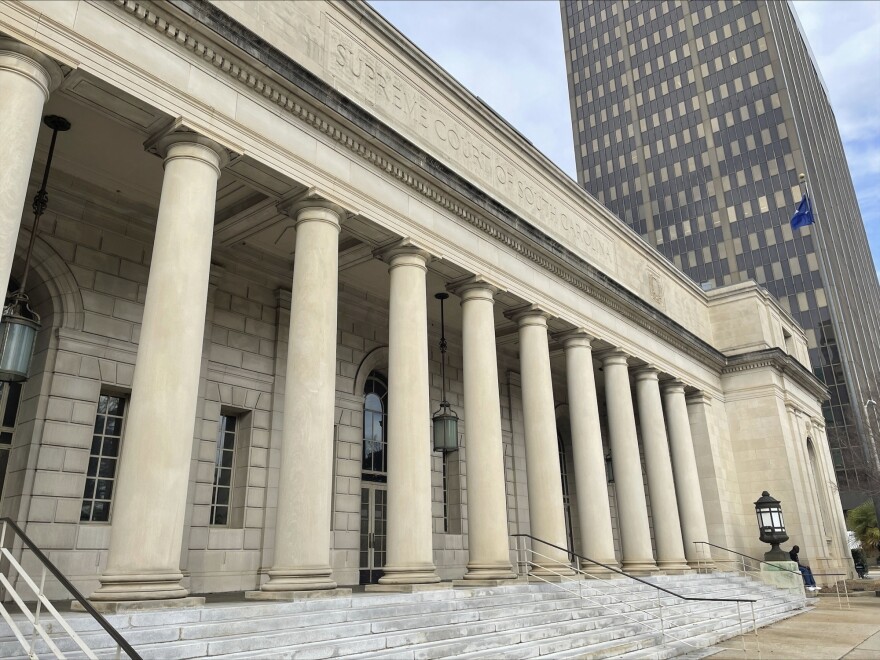An all-male S.C. Supreme Court on Aug. 23 upheld the state's six-week abortion ban, overriding a January decision that ruled a similar ban violated the state Constitution's privacy provision.
The 4-1 decision marks a win for anti-abortion groups and many of the state's conservative legislators, who for years pushed to restrict access, especially after the U.S. Supreme Court in 2022 removed federal-level protections.
It follows the election of Justice Gary Hill, who filled a vacancy left open this year after the court's lone female justice, Kaye Hearn, retired because of the state's age limit for judges.
Narrowing the state’s previous 20-week prohibition, the Supreme Court’s ruling now puts South Carolina on par with most other southern states, which have also sought to aggressively restrict abortion access post Roe.
"The Supreme Court's ruling marks a historic moment in our state's history and is the culmination of years of hard work and determination by so many in our state to ensure that the sanctity of life is protected," Gov. Henry McMaster said in a statement. "With this victory, we protect the lives of countless unborn children and reaffirm South Carolina's place as one of the most pro-life states in America."
House Speaker Murrell Smith, R-Sumter, also praised the decision, calling it a "victory for life in South Carolina." And the S.C. Senate Republican Caucus said, in part, that the ruling has "resulted in the birth of a new South Carolina."
The law offers few exceptions for fatal fetal anomaly, the mother’s life and rape and incest — the latter two, however, limited to up to 12 weeks of pregnancy. The doctor also must report the crime and the victim’s contact information to the area sheriff’s office within 24 hours.
The state has only three clinics that provide abortions: two run by Planned Parenthood in Columbia and Charleston, and a third in Greenville run by the Greenville Women's Clinic.
Planned Parenthood said it had turned away patients from its abortion clinic in Columbia, and added patients were also turned away in Greenville.
"This decision dangerously flies in the face of longstanding precedent, and demonstrates the harmful politicization of the state's highest court, which has shamefully done the bidding of anti-abortion politicians," said attorney Catherine Humphreville, who argued Planned Parenthood's case in June before the court.
Justice John Kittredge wrote the majority opinion.
He was joined by Justices George James, Gary Hill and John Few — the swing vote in January to overturn the ban who this time ruled with the majority to uphold the new law but wrote a separate concurring opinion.
"The judiciary's role is to exercise our judgment as to whether the legislative weighing of competing interests was within the range of possible, reasonable choices rationally related to promoting the legislature's legitimate interests," Kittredge wrote. "Having concluded that it was, we consequently defer to the legislature's gauging of the profound, competing interests at stake."
Alone in the dissent was Chief Justice Donald Beatty, the court's only Black justice, who will retire after next year due to the state's mandatory retirement age, 72, for judges.
Running to succeed him is Kittredge, who has filed his candidacy with the Legislature's Judicial Merit Selection Commission.
"The title and content of the legislation are a misnomer if it is viewed as a six-week ban because the terminology is medically and scientifically inaccurate," Beatty wrote in his dissent. "As such, it is the quintessential example of political gaslighting; attempting to manipulate public opinion and control the reproductive health decisions of women by distorting reality."
In May, after months-long Republican infighting, the General Assembly passed a new law banning abortions after cardiac activity is detected by ultrasound, typically around the sixth week of pregnancy.
The second version of the state's abortion ban was passed despite a 3-2 January S.C. Supreme Court ruling that found personal health care decisions, such as an abortion procedure, are protected under the state’s Constitution privacy provision.
In that case, former Justice Kaye Hearn wrote in the majority that a six-week ban did not give women enough time to make an “informed choice” over their own health care decisions.
“It is impossible to conclude that the average woman who determines she is pregnant at just over five weeks has sufficient time to weigh her options, schedule an appointment at one of the three clinics in the state, and comply with the mandatory waiting periods before having an abortion,” Hearn wrote in the court’s January opinion.
“This confirms that in reality, there is no ‘choice’ at all,” she added.
Hearn, who was the lone female justice on the court and the second woman to ever sit on the state’s highest bench, has since retired.
In her place, lawmakers elected Justice Gary Hill, resulting in an all-male Supreme Court.
"Until we change the players (state lawmakers), the plays in South Carolina are going to remain the same," Vicki Ringer, public affairs director with Planned Parenthood South Atlantic said in a Aug. 23 virtual press conference.
With Hill on the bench, the court for the second time debated the new six-week ban.
In the roughly one-hour court hearing in June, an attorney for Planned Parenthood South Atlantic argued that the new so-called “fetal heartbeat” abortion ban was identical to the previous ban overturned in January.
“Nothing in the short period of time since January, since the court’s ruling, justifies a second bite of the apple here,” attorney Humphreville said.
But lawyers for the state and GOP leaders disagreed with Humphreville, saying that the January opinion did not set a precedent because the three justices each wrote separate opinions. And, written largely in response to Justice John Few’s opinion, attorneys said the Legislature also made tweaks to the ban expanding choice.
State attorney Thomas Hydrick also cited 2020 data from the Centers for Disease Control and Prevention, which he said showed 45% of abortions nationwide occur within six weeks of pregnancy.
“I promise you, I’m not changing my analysis,” Few told attorneys in June. “But that does not mean the outcome is the same.”
This time, in the Aug. 23 opinion, Few joined the majority to uphold the six-week ban.
"My vote in Planned Parenthood 1 was based on the fact the General Assembly did not even consider what I then called the 'key question.' For that reason, the 2021 Act was arbitrary and, thus, unreasonable," Few wrote.
"In the 2023 Act, however, the General Assembly not only considered the key question, it changed the question — as it is absolutely entitled to do — to focus the attention of sexually-active couples in South Carolina on active family planning, thereby expanding the notion of choice to the period of time before fertilization, certainly before a couple passively learns of a pregnancy. The abortion restrictions in the 2023 Act are reasonable."
With the six-week law upheld, where does the debate at the State House go from here?
Senate Majority Leader Shane Massey told reporters that "I think we need to let this settle."
"Let's see how this plays out in South Carolina before we do anything else," the Edgefield Republican said, adding he believes the court decision will be a general election issue. "This is the consensus policy agreement here, so I hope that this is where we'll land for a while."



